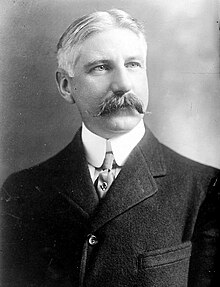Eugenius Harvey Outerbridge (March 8, 1860 – November 10, 1932) was a businessman and promoter of patent fiberboard, and the first chairman of the interstate agency known then as the Port of New York Authority. The Outerbridge Crossing, a Port Authority bridge, was named for him.[1]
Eugenius Harvey Outerbridge | |
|---|---|
 | |
| Chair of the Port Authority of New York and New Jersey | |
| In office 1921–1924 | |
| Preceded by | Position Established |
| Succeeded by | Julian Gregory |
| Personal details | |
| Born | March 8, 1860 Philadelphia, Pennsylvania, U.S. |
| Died | November 10, 1932 (aged 72) Manhattan, New York, U.S. |
| Parent(s) | Alexander Ewing Outerbridge (1816–1900) Laura Catherine Harvey (1818–1867) |
| Relatives | Mary Ewing Outerbridge, sister |
| Known for | Homasote Outerbridge Crossing |
Biography
editEugenius was born on March 8, 1860, in Philadelphia, Pennsylvania, to Bermudians Alexander Ewing Outerbridge I and Laura Catherine Harvey. His sister, Mary Ewing Outerbridge, was the founder, in 1874, of American lawn tennis which was the progenitor of modern tennis. His other siblings include Albert Albany Outerbridge, Sir Joseph Outerbridge (1843–1933), August Emelio Outerbridge (1846–1921), Harriett Harvey Outerbridge, Alexander Ewing Outerbridge II, Laura Catharine Outerbridge and Adolph John Harvey Outerbridge (1858–1928).[1]
Outerbridge incorporated the Agasote Millboard Company in 1909 to produce a high-density fiberboard. The company used the material to produce roof panels for railroad cars and automobiles. In 1916, the company introduced Vehisote, a versatile fiberboard made from recycled materials, made by the company in West Trenton, New Jersey. Both the product and the company were later renamed as Homasote, and remain in active production as of 2022[update].[2]
Outerbridge was the first chairman of the Port of New York Authority, now the Port Authority of New York and New Jersey. The new authority was founded on April 30, 1921, and was the first interstate agency created under a clause of the US Constitution permitting compacts between states.[3]
Outerbridge was among the founding organizers of the Richmond County Country Club on Staten Island in 1888.[4] He was a longtime member of the Union Club of the City of New York and, until his death, he was chairman of the Building Committee in charge of planning the 69th Street clubhouse.[5]
He died on November 10, 1932, at 950 Park Avenue in Manhattan, New York City.[1]
Legacy
editThe Outerbridge Crossing, a toll bridge between Staten Island, New York, and Perth Amboy, New Jersey, is named in his honor. It opened on June 29, 1928.[1]
Timeline
edit- 1860 Birth
- 1880 US Census with Eugenius Outerbridge
- 1909 Starts Agasote Millboard Company
- 1916 Homasote
- 1921 Starts tenure at Port of New York Authority
- 1924 Ends tenure at Port of New York Authority
- 1928 Outerbridge Crossing named for him on June 20
- 1932 Death
See also
editReferences
edit- ^ a b c d "E. H. Outerbridge, Port Expert, Dies. Head of Export and Import Firm and Ex-Chairman of Port of New York Authority. Aided Major Harbor Plan. Comprehensive Development Started in His Term of Office. Twice Chamber of Commerce Head". The New York Times. November 11, 1932. Retrieved January 14, 2020.
- ^ "Products". homasote.com. Homasote Company. Retrieved July 30, 2022.
- ^ Broun, Caroline N.; Buenger, Michael L.; McCabe, Michael H.; Masters, Richard L. (2006). The evolving use and the changing role of interstate compacts: a practitioner's guide (Google books preview). Chicago: American Bar Association. p. 368. ISBN 1-59031-643-6. Retrieved September 20, 2011.
- ^ Historical Souvenir Book of the Fiftieth Anniversary of the Richmond County Country Club, June 4–5, 1938. Staten Island, NY: Richmond County Country Club. p. 5.
- ^ Archives of the Union Club of the City of New York.
External links
edit